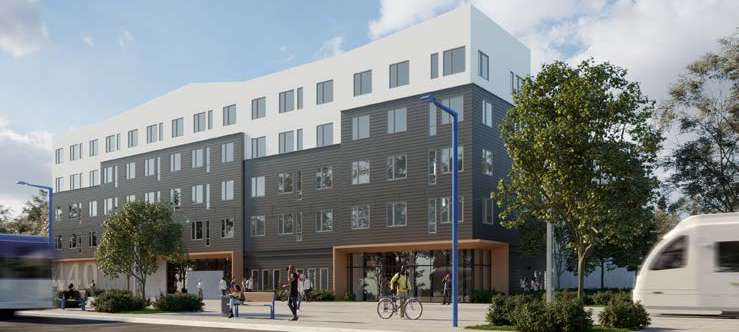BRIDGE Housing Corporation was born of an act of generosity. In 1983, an anonymous donation to the San Francisco Foundation enabled the philanthropic organization to create BRIDGE in an effort to address the city’s ever-present housing shortage. Since then, the nonprofit has helped build new foundations for families and communities from San Diego to Seattle, with 18,000 homes in more than 100 properties – almost all of them permanently affordable. BRIDGE is also the long-term manager of over 12,000 affordable units.
“Our mission is to strengthen communities and improve the lives of our residents, beginning—but not ending—with affordable housing,” says Ken Lombard, President & CEO of BRIDGE Housing. “We serve communities by building and operating high-quality affordable homes for families and seniors, often with amenities that benefit the broader neighborhood, like childcare, retail and green space.”
An innovative approach
In the 1980s, government-run affordable housing projects had a problematic reputation. BRIDGE offered a different approach: A nonprofit corporation that balances both its bottom line and the flexibility to meet residents’ and communities’ needs by not only developing and building properties, but maintaining and professionally managing them as well.
“It’s run essentially as a mission-driven business enterprise” says Jonathan Stern, director of planning and acquisitions. “We aggregate subsidies for our projects, for their construction, and then operate and manage them with the goal of long-term sustainability, both financial and physical.”
Quality, quantity and affordability
BRIDGE serves communities by building quality homes, a lot of them, and ensuring they stay affordable. It’s estimated that Sacramento will need 36,014 more affordable housing units over the next several years to meet housing needs across the county. While many developers build a handful of affordable units, BRIDGE builds 100 units or more at a time. At the heart of their mission, however, is affordability: By using public subsidies, BRIDGE commits to keeping units affordable—between 30-80% of the area’s median income level—for 55 years or more.
“We’re not just trying to provide some small amount of bespoke housing, we’re trying to provide a lot of it. That’s important for us,” Stern says, adding, “We understand the quality experience is not just the building, but that people can actually afford it.”
More than a roof and four walls
While a safe and healthy home is the foundation to a good life, BRIDGE also offers residents tools and opportunities to improve their lives in other ways.
“In terms of lasting change, we’ve always believed that an apartment with an affordable rent is a stepping stone for advancement, so we offer a range of programs and services to help residents thrive,” Lombard says. “Eighty-three percent of our properties offer services such as food distribution, homework support for kids, employment support for adults, and senior services that focus on health and aging in place. We’ve also awarded more than $2.5 million in scholarships to help residents achieve their educational and career goals.”
Community building
There’s no one-size-fits-all solution to housing. So to meet the needs of the tenants and neighborhoods it serves, BRIDGE collaborates with local governments and communities to customize their buildings and services.
“We are used to dealing with complex physical and administrative [requirements],” Stern says. “Affordable housing is complex enough that there will be time to be thoughtful. … We know we’re going to be there long term and we’re committed to starting off on the right foot. And we know that our customers are certainly the people who live in our housing, but it’s also the neighbors and the government that funds us. We want to build in cities and in places that align with our values.”






























